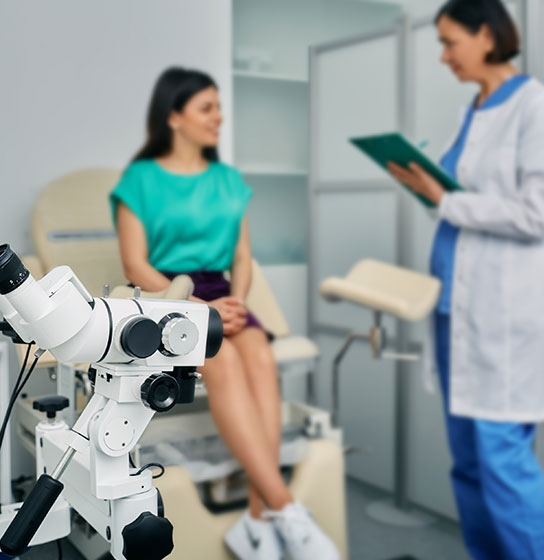
Key Takeaways:
- HPV is common and easily spread. Our immune system is usually able to fight this infection, but sometimes it can’t, leading to more serious disease, like cervical cancer.
- The HPV vaccine used in the United States protects against the 9 most common strains of HPV that can cause cancers and genital warts.
- The HPV vaccine can prevent over 90% of HPV associated cancers.
- The HPV vaccine is recommended for adolescents (girls and boys) starting at age 9-12 and can be given up until the age of 26. Some adults, ages 27 to 45, can also receive the vaccination.
What is HPV?
HPV is the human papillomavirus. It is a common infection spread through sexual or skin to skin contact. There are many different strains of the HPV virus, which are classified as low-risk or high-risk HPV. HPV can affect different parts of the body to cause different diseases; from mild conditions such as plantar warts, to more serious conditions such as cancer.
There are about 14 types of high-risk HPV that can cause cancer of the cervix, vulva, vagina, penis, anus, mouth and throat. HPV can be asymptomatic, and our immune system can often fight to resolve the infection. However, some high-risk HPV infections can be persistent, leading to precancerous cell changes and ultimately cancer.
Cervical cancer is often caused by high-risk HPV type 16 and 18. Screening for cervical cancer in women is the best way to prevent and diagnose high-risk HPV associated cervical cancer - which accounts for nearly all cervical cancers.
Fortunately, there is also a vaccine!
What is the HPV vaccine?
The HPV vaccine used in the United States is called Gardasil 9 ®, which protects against the 9 most common strains of HPV that can cause cancers and genital warts.
Why should I get vaccinated?
HPV is common and easily spread. Our immune system is usually able to fight this infection, but sometimes it can’t, leading to more serious disease. In the United States, it’s estimated that HPV causes over 37,000 new cases of cancer per year. We know that the HPV vaccine can prevent over 90% of HPV associated cancers. Getting vaccinated not only helps to prevent mild disease, but most importantly, the more serious diseases (HPV associated cancers).
How does the HPV vaccine work?
Like most vaccines, it contains a small component of the HPV virus. When administered, it helps to produce an immune response to the HPV virus. Our immune system stores this response in case it needs to remember it in the future to help fight an HPV infection. The vaccine does not cause an HPV infection.
Who is eligible for the vaccine?
The HPV vaccine is recommended for adolescents (girls and boys) starting at age 9-12 and can be given up until the age of 26. The vaccine is administered at a young age to help the body build a defense prior to any exposure of HPV. It is given as a 2 or 3 dose vaccination series depending on the starting age of vaccination.
Some adults, ages 27 to 45, can also receive the vaccination. The eligibility for the vaccine in this age group can vary from person to person based on risk (i.e. individuals with multiple sex partners, immunocompromised individuals are at higher risk of getting HPV), so it’s important to talk to your healthcare provider to assess your personal health profile.
A 2-dose vaccination series is given to people who get the first vaccine dose before age 15 (0, 6-12 month schedule). A 3-dose vaccination series is given to people who get the first vaccine dose at age 15-45 (0, 1-2, 6 month schedule). If a vaccine dose is missed, previous vaccine doses do not need to be repeated and your provider can help with catch-up vaccine doses.
Is the vaccine safe?
Yes! The HPV vaccine went through vigorous safety testing before it was approved by the FDA (U.S. Food and Drug Administration) in 2006. It has been in use for over 15 years, and its safety and effectiveness continues to be proven through close monitoring by the CDC (Center for Disease Control and Prevention) and FDA.
Will I have any side effects from the vaccine?
You can have mild side effects from the HPV vaccine (similar to other vaccines) such as a fever, headache, dizziness, nausea or muscle ache. You may also develop redness, soreness or swelling at the site where the vaccine was given to you. These symptoms usually resolve within 24-48 hours after the vaccine.
It is important to notify your provider if you have any severe or life-threatening allergies or had a previous allergic reaction to the HPV vaccine. The HPV vaccine is not recommended during pregnancy.
Do I still need to get screened for cervical cancer if I get the HPV vaccine?
Yes! It is still important to continue screening for cervical cancer even if you have received the HPV vaccine. While the HPV vaccine protects against some of the most common strains of HPV that can cause cervical cancer, it does not protect against all.
*May 2025 Update: The Teal Wand is FDA-authorized. Check medical eligibility to get started and see if Teal is right for you. If we are not available in your state just yet, you will be placed on our waitlist and we will notify you when we are available in your state.
Skip the stirrups
To get early access, enter your email below.
$99 with insurance
$249 without insurance (reduced from $499)


🔒 100% Private & Secure • No Hidden Costs








